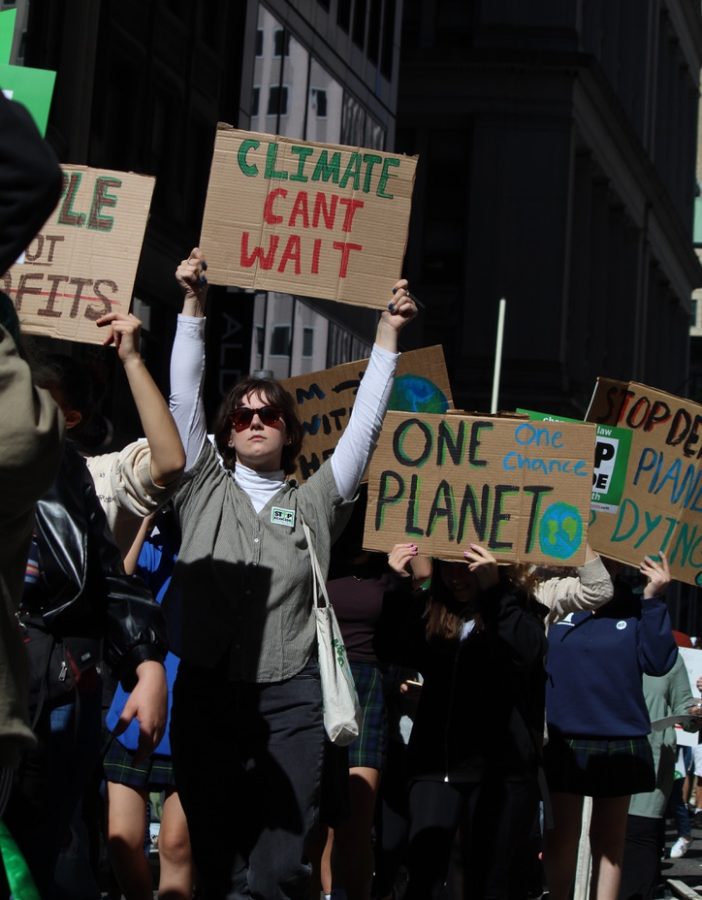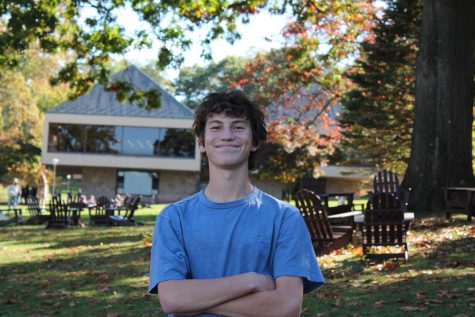Students and admin can’t see eye-to-eye on climate march
Student demonstrators holding anti-climate change protest signs at a rally. Photo contributed by student Sabine Godwin.
November 4, 2022
Masters EFFECT—a club that specializes in environmental sustainability — arranged for students to leave school early on September 23, take the train to Manhattan, and participate in a once-a-year nationwide strike to speak out against lawmakers who aren’t pushing to stop climate change.
In the words of Jeff Carnevale, dean of students, “Being an activist is part of being a Masters student.”
However, the day of the climate strike was the same day as the annual Founder’s Day celebration. Since students who were attending the march would be missing academic classes before the Founder’s Day event began, conflict built up between the student body and the Upper School administration over whether students who missed classes would need to make up work and follow up with their teachers. The administration decided to treat it as a usual excused absence, which would require those students to follow up with their teachers as usual.
Despite the excused absence, students who attended the march were not happy because they still had to meet with teachers for the time they missed. Addressing this concern, Carnevale said,
“ [Meeting with teachers] is part of being absent from school. Whenever a student is absent from school, they are expected to connect with their teachers and get caught up on any work, so that is what the expectation was on that day as well.”
EFFECT’s senior advisor Tyler Hack and Co-Chair Sophia Semczuk see it differently. When asked why there was a conflict in the first place, Hack explained that the march was “an event that is bigger than Masters” while Founder’s Day is a “moveable” event.
Hack said, “The DAA Co-Presidents tried to move Founder’s Day or move it to that morning so the students could participate in Founder’s Day and still make it to the march.” However, due to the scheduling decision that the administration made, there was no budging on the moving of events.
On top of this, Semczuk noted that EFFECT had given administration a heads-up about the event happening over a year in advance, and Founders Day was still coincidentally planned for the same day. Once they realized the administration would not shift the date, there was no intent to cancel EFFECT’s participation in the march, but it was a setback.
Semczuk said, “There was definitely disappointment and it felt like something that could’ve hindered us from having success with the event.”
Peter Newcomb, head of Upper School, had a different perspective. When he was first approached with making a unique excuse for the students attending the march, he said, “What qualifies as a larger event? There are lots of once-a-year events that happen that people feel strongly and passionately about and it’s not our place to say this qualifies [for a certain level of absence] and this doesn’t.”
This approach made both march attendees and EFFECT leadership feel that Newcomb, administration, and Masters as a whole were not valuing the importance of this event. In response, Newcomb said, “We are not treating this differently, but that doesn’t mean it’s not important. It’s just we’re not positioned to say, ‘This is an important one that you believe in and this is an important one that we [Masters administration] don’t believe in.’”
Despite EFFECT students still not being happy with the decision from the administration, both the march and Founders Day were deemed successful by participating students. “It was really great to see people expressing genuine care about the protest and the message of the protest and having the willingness to leave on Founders Day to support this cause,” Semzuk said.
On top of that, Newcomb said, “I think they did a great job. They didn’t get the result they wanted, but I thought they did a wonderful job of articulating a rationale for this event.”




